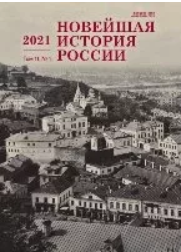Бремя войны: солдаты и рождение социального конфликта в 1917 году
Burden of War: Soldiers and the Birth of Social Conflict in 1917
Author(s): Konstantin A. TarasovSubject(s): Military history, Government/Political systems, Pre-WW I & WW I (1900 -1919), Peace and Conflict Studies
Published by: Издательство Исторического факультета СПбГУ
Keywords: Revolution; First World War; garrison; mobilization; army; Provisional Government;
Summary/Abstract: The article examines the distribution of burdens from Russia’s participation in the First World War. During this period, dissatisfaction with the balance between those who went to the front and those who remained in the rear could be expressed openly. By 1917, the human reserves of the Russian empire were practically exhausted. At the same time, a large part of the population enjoyed deferrals from serving in the army. After the revolution, servicemen, many of whom had already been on the front line and were wounded, were very active. They demanded that soldiers who served in rear units should go first with new reinforcements. This category included new recruits, soldiers of auxiliary troops, military clerks, officers, and all ranks who were involved in training in reserve battalions. By the summer of 1917, soldiers demanded the mobilization of former policemen, deserters, and everyone who legally or illegally used deferrals from military service. In the end, the slogan “The bourgeoisie to trenches!” was born spontaneously. This meant sending to the front all who profited from the war by remaining in the rear. The spread of this slogan speaks of the assimilation of the language of class antagonism by soldiers. It also became important to the escalation of civil war. The demands were directed to the state authorities whose silence led to soldiers’ desires to implement “mobilization” on their own.
Journal: Новейшая история России
- Issue Year: 11/2021
- Issue No: 34
- Page Range: 28-46
- Page Count: 19
- Language: Russian

